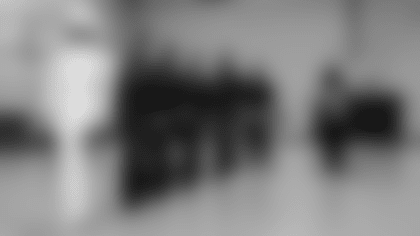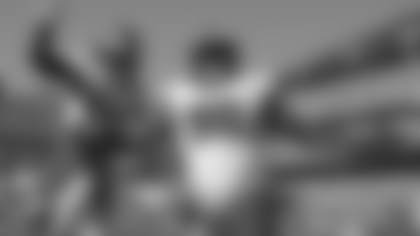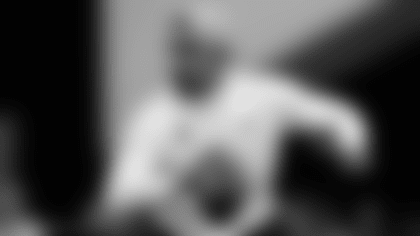Jim, after one year away from coaching, what kind of perspective does it give you back on the profession?
JIM SCHWARTZ: You never get too far away from it. There are a lot of coaches that have spent a year off. You're always involved in the game somehow. I was fortunate enough to have the video of all the games doing what I did with the NFL officiating. So you always stay pretty close. You know enough people in the league. You're watching enough games. You're staying current on everything.
How did it benefit you?
JIM SCHWARTZ: I think the biggest thing is looking at things from a different perspective. Looking at it through an official's eyes. You know, when you're on a team whether you're the defensive coordinator, the head coach or quality control coach, you have a dog in the hunt, so to speak. You have a slanted perspective of what a foul is, what should be thrown, what shouldn't be thrown. You're always going to see it through that prism. When you're truly neutral and you can just watch, I think you can learn a lot about how things get officiated and I learned an awful lot that way last year.
The system you had in Buffalo, are you implementing the exact same system here? Or is it different because they're different players?
JIM SCHWARTZ: Every year will be a little bit different. Our terminology is a little bit different. Cast of characters is a little different. And if we're on the right track, we'll put the players in the best position to best use their talents. What we did in Buffalo was a little different than what we did in Detroit, which was a little different from what we did in Tennessee. But it's all designed to try to make the most of what you have. I had a guy, Jerry Hughes, that was probably 245 pounds that played defensive end. He had to do it a little bit different than a Ziggy Ansah in Detroit or Vinny Curry here.
How do you see your corner situation right now? McKelvin and Brooks first team and Jalen Mills coming in?
JIM SCHWARTZ: Yeah, I mean, if you come tomorrow, you'll see a completely different group. We don't have a depth chart now. We're just trying to work different groups. You work different combinations. You want to see guys against different competition. Jalen had been going mostly against rookies, and we wanted to see him against some of the veteran wide receivers. So this time of year, you're mixing and matching an awful lot. You're trying to put guys in a lot of different situations and trying to sort of see what you have. They're honestly really not even competing right now. They're competing against themselves to try to improve their technique. To try to improve their understanding of the scheme, but the competition will start once we get to training camp. Once we really get going with some contact and full team drills and things like that.
What have you seen from Jalen Mills? Does he seem to be a quick learner? Have you found that he's picked up things pretty quickly?
JIM SCHWARTZ: Yeah, it's a little too early to put anything on him. He's been impressive so far. But we haven't really even started yet, to tell you the truth. He's got a lot to learn, and his head's probably swimming a little bit. But what he has shown is he's a very good athlete. He can play the ball, and he's comfortable being on an island. I think if you were check-marking things for corners, those would be three near or at the top.
Some other safeties added corner to their resume. Is that by design just to see how it could operate?
JIM SCHWARTZ: Yeah, you know, the way offense is run now, particularly with multi-dimensional tight ends, you saw the emphasis our team put on those tight ends and some of the contracts that those guys got. You are other using them in a lot of different ways. You're lining them up as wide receivers. You're motioning them and doing all those different things. And if you have a safety that's not comfortable playing out there like a corner, you're going to be in trouble. So it's probably just an eye toward getting ready for those situations. They detach a tight end, put him on the back side. There are a lot of teams that do that. They're a big body. They can throw a fade and do a lot of different things that way. Our safeties have to be comfortable executing that. Both of our safeties and a lot of our safeties, let's put it that way, have corner in the background. That's for a reason.
When you look at Bennie Logan, how is he transitioning over from a nose tackle to a 4-3 defensive tackle?
JIM SCHWARTZ: All those guys have an adjustment period. It's not just a change of position from a nose to a defensive tackle. It's really a change of philosophy from an at-the-line two-gap philosophy to an attack, get off the ball, and one-gap penetrate philosophy. So those guys have had some ups and some downs. You don't want to read too much into it now. They don't have pads on. I mean, you can get excited about defensive linemen. You can get down on defensive linemen. But when we get those full pad practices at training camp and we start getting into preseason games, I think we'll really have a good grasp of how far those guys have come and what they're good at and what they're not. But they're on the right track.
What was your input on the three Bills players brought in during free agency and why did you target them?
JIM SCHWARTZ: Well, anytime you have experience with players you're going to have greater insight than people that haven't been up close and personal with them, so to speak. I'm not writing any checks and I'm not making any final decisions. But anytime we have a resource, whether it's me, another coach, some scouts came from different organizations, you know, you always try to get some firsthand knowledge of a player, and I think it was obvious that I was comfortable with those guys.
What do you like about Leodis McKelvin?
JIM SCHWARTZ: The year I had him he was playing at a really high level before he got hurt. He broke his ankle against Miami, and really was playing at a high level. He's not the tallest guy around, but he can jump, he can play the ball in the air. Mentally and physically tough. I don't know if you see that just seeing his body shape. But he'll go throw his body around and hit. He was a first round draft pick. He's played at a high level in this league.
Have you spoken to Fletcher Cox since he took the job?
JIM SCHWARTZ: Yeah, I think any conversations I have with players, I don't want to bring them into a press conference or meeting, so I'll just choose not to comment on that.
How much is he missing by not being here?
JIM SCHWARTZ: Well, I mean, it's voluntary, so you can only do so much. Fletch was drafted in a scheme that was similar to this. He'll catch up, but, you know, I'm sure there will be some carry over for him. I assume he's a fast learner and I assume he'll pick things up quickly.
When he came here, did you envision him playing your defense and how well he'll fit into playing what you want him to do?
JIM SCHWARTZ: Yeah, well, that's probably enough Fletcher Cox speak. Let's just talk about the guys that are here. I really can't comment on the guys that aren't here. I haven't had any experience with those guys. So anything I would say would be hypothetical, to tell you the truth. I did look at, as a whole defensive staff did, we evaluated last year and what guys did, and he certainly had an impressive year last year. We think that scheme-wise and technique-wise what we do is going to fit him very well.
Do you have any thoughts on Marcus Smith as far as whether he fits a 4-3, wide nine scheme maybe better than a 3-4?
JIM SCHWARTZ: I think the biggest thing when you're talking about a young player is allowing him to grow at, I guess, at the right pace. I don't know if that's the best way to put it. But first of all, let's reserve judgment on any of those guys until the pads come on. But this is a scheme that greatly limits what he's asked to do. Very easy in theory, difficult in execution, but easy in theory. Should allow him to play fast, attack spots, you know, give him a little bit less responsibility but hopefully allow him to make a greater impact. He's very athletic. He's got great size. He's done very well so far, but let's reserve judgment on any of these guys until we get pads on them.
Mychal Kendricks has experience playing I guess both Sam and Will in this similar type scheme. How do you envision him eventually where he's going to end up?
JIM SCHWARTZ: Yeah, we're moving those guys around a lot of different ways, a little bit like our corners. We talked about lining some guys up inside, lining them outside, getting them ready for a lot of different situations. We're really not a hundred percent how we're going to lineup our linebackers. I've had times where we've lined up guys that just played right and left. Give you an example. When I was in Tennessee, Keith Bullough always played on the right side. He was comfortable on the right side. Played on the right side regardless of whether the tight end was to the right or the tight end was to the left. When I was in Detroit, it was pretty much the same way, and Buffalo we flipped guys and our linebacker coach then Fred Pagac had experience flipping guys when he was at Minnesota, and it matched what we did. I think that decision will be made as we go through training camp and go through preseason games, whether we're going to play right or left, or whether they're going to travel with a tight end or travel to the open side. You know, there is something to be said for both of them. You can make it a little easier on a player if he flips, because he's seeing the same looks. Even if it's from the right or left, he's seeing the same blocking schemes, just from a different side. Then, again, you could look at it and say it's easier just to lineup on one side and get used to playing that one side and playing what you see. Too early to tell exactly how we're lining up. It's pretty much the same thing with safeties. Those two positions, you have to lineup outside, you have to lineup inside, you have to lineup deep. How we'll line those guys up will be determined by training camp and preseason games.
Can Nigel Bradham play both Sam and Will?
JIM SCHWARTZ: Yeah, and both of those guys can. All of those guys are pretty much interchangeable, and you have to be now. It's very rare you're going to see people lineup with two back, tight end in the core and two wide receivers. Those days are long past. You see that ten snaps a game maybe. A lot of times you're playing three wide receivers, detached tight ends. You better be a multi-dimensional player. You can lineup in space, lineup in the box, cover man, play zone, if not you're going to be a target for the offensive coordinator. You're going to be a target for the quarterback. Both of those guys, Kendricks and Bradham both can do those things. They're good run stoppers as well as they can play in space.
What has your experience taught you about year one of a new defense? Kind of the best way to attack it, and how big an undertaking it is to transition to it?
JIM SCHWARTZ: I think my experience has told me that every year is different and you can't judge one year on something else. Everybody picks things up at a different pace. Players are different, you know, there is a different dynamic with coaches. I think if you prejudge anything and say this is what's going to happen, I think you're on the wrong track. You've got to keep an open mind. It's hard to be patient in the NFL. But you have to be patient this time of year because we don't have any games scheduled on Sunday and the most important thing is making progress on technique and fundamentals, and building a good foundation that you can draw on in September. I think that's the most important thing now and anything else you just have to play it as it comes to you. You just have to judge everybody on this year and not what happened in the past.
You were at the Senior Bowl with Brandon Graham prior to the 2010 draft. He comes into the NFL playing the four-three, then stands up as a linebacker. Has this looked like a natural transition for him?
JIM SCHWARTZ: Well, I've had Brandon for a week, probably less than a calendar week. So I don't know if you can classify that with having worked with him before. But, again, we talked a little bit about Fletcher being drafted for an attack scheme. You know, maybe a little different alignment, maybe some things have changed but still an attack scheme, and Brandon was drafted the same way. He was drafted for an attack scheme. You know, there's a lot of things that he brings to the table. He's strong, he's hard to handle on the edge. Sometimes that lack of height that he has that some people think is a disadvantage he can use to his advantage. I think of some guys in the history of the NFL Dwight Freeney is one, Dumervil, some of those guys that sometimes you get those 6'7", offensive linemen, and they have a hard time handling those 6'1, 6'2 type guys. They have a little different leverage, and it gives them a different look. I think Brandon could bring some of that.
As a former head coach, has Doug Pederson used you as a resource?
JIM SCHWARTZ: I think Doug is very good at using a lot of different resources. We have a lot of different experiences on the staff. Some guys were here last year, that's valuable insight to him. I've been a head coach before. I think that's valuable insight to him. I think that's one of the good things about him. He doesn't have very much of an ego and he's open minded when it comes to a lot of different things. The same thing goes with players. I see him talking to players all the time and getting their input on things. I think that's all important. He's going to make his own decisions. He's his own man, and he's going to have to find his own way. But sometimes people can have a little different -- you know, a little different input or a little different experience that he might be able to draw from. He's not shy about asking anybody their opinion.
As a follow-up on the safeties and the major investment you made in those guys this off-season. What is the value of having two players like that?
JIM SCHWARTZ: That was money well spent. I'm sort of violating my rule with judging too much into this time of year. Both of those guys are veteran players and you can see that right away. They're both multi-dimensional. They communicate very well. They can cover a lot of ground. They can blitz, they can play man, they can play zone. I'd be very surprised as the year went on if they're not one of the better safety tandems in the NFL. They've been very impressive so far.
What are your thoughts on Quentin Gause?
JIM SCHWARTZ: You know, when the draft is over, there are a lot of guys that you had a lot of feeling for. Your scouts had a lot of feeling for that you think are going to fit into the scheme. And it's a matter of trying to sell that to them and how it can best match their skills. He was a guy, I remember one of the scouts coming to me a couple weeks before the draft and asking me to look at him. Knowing we weren't going to have a whole lot of draft picks and we were going to have to hit on some of those free agents.
I saw a stat, you guys would probably have to look it up more than I know, but it had something to do with like Pro Bowl players and it was like the number of first rounders of first Pro Bowl players, number of second rounders, number of third rounders. Well, after first, second, third rounders, by far the greatest concentration of Pro Bowl players have come from undrafted free agents. We just talked about Rodney McLeod coming in the same way. Those guys all have an opportunity. He's played inside and outside, he's strong. Like a lot of rookies his head is swimming right now. They're working really hard to try to get ahead of the curve so that when camp comes, they can show their very best. He's on the right track, but he's got a long way to go.
I wanted to ask you about another undrafted free agent that I assume you had some input into signing and that's Myke Tavarres. [Cardinals safety] Deone Bucannon's success has kind of spawned teams looking for somebody like that. Does he kind of fit that mold of undersized, safety linebacker hybrid or not?
JIM SCHWARTZ: No, that's not. He actually played on the line of scrimmage at Incarnate Word. That's the first time I ever thought I'd say that, [that] I'd use Incarnate Word in a press conference. I don't know a whole lot about college football, but they actually played a pretty good schedule last year. They played UTEP. Played Steven F. Austin. They played Sam Houston State. They played teams that I'm familiar with. You were able to see him. But he played at the line of scrimmage. He's 235 pounds. He's not that guy. He's more going through the transition of moving back and being more coverage oriented. You know, I think that's going to best fit his skill set. He can run, made a lot of plays in college, but he also went from junior college, cup of coffee at Arkansas to Incarnate Word, so he's got a big jump ahead of him. But he has the skill set to be able to do it. That was another guy like Quentin that we thought a lot of after the draft and tried our best to get him. We were lucky enough to get him signed.
When you were going through the draft, how much input did you have on guys not only defensive guys being drafted but whether or not they'd be good in schemes or fit into your scheme? Did that matter?
JIM SCHWARTZ: Well, obviously it matters. You don't draft guys blind. You don't draft guys and say, you know, hey, let's do something with them. I think our greatest input as coaches came probably before draft meetings, where there was a lot of back and forth and what we were going to ask players to do. What kind of skill sets we were looking for and what criteria we were going to judge them on. And the scouts could use that lens to be able to see those guys. Scouts had a very difficult job because they spent most of the college season or all of the college season, particularly for defensive players, even a little bit the case for offensive players, scouting for a system that changed. And that's a very difficult situation. So one of the very first things we did when we got here was sit down and go through a couple days and talk about just blind of players, not talk about a particular player, but just generalizations, what a player's going to be asked to do. What kind of guys you've had success with. What kind of guys you've had failures with. You know, try to be able to mold a model of what we're looking for.
That's sort of continuing now. And that will continue all along the way. I don't think there's an NFL team that coaches don't evaluate for the draft, but I think a lot of times it's an affirmation of what the scouts saw. Or it's a sign, hey, we might need to do a little more work on this guy. I don't know any coaches that trump what the scouts have done, and I don't know any time in the NFL that scouts will draft guys that the coaches don't think are a very good fit.
So it's a two-way street. Probably just, you know, we're just touching the surface of that relationship between the coaches and the scouts.
What did you see out of Joe Walker and Alex McCalister?
JIM SCHWARTZ: You know, Joe has -- it's very difficult to play linebacker, and I'll throw [Blake] Countess in there too, safety. Those are positions that you have to know where all the pieces fit together, and you've got to be the guys that are making calls on the run. Joe's going through a little different experience going from the system he played in college where he was a lateral player. He wasn't attacking the line of scrimmage, north-south guys, more lateral. So he's learning on the way. But he's shown he can make a play in the passing game. He's a good athlete, he's long, he's hard to throw. He didn't have a very good day today, but it starts to creep up on those guys. They feel comfortable with one thing, and all of a sudden you're adding three more defenses. They're going out and trying to execute those. All their heads are swimming right now. But they will start to come back. McAlister's a really good athlete. Tall, long, can affect the passer, so he's got really good athletic ability to go. He's gaining strength. He's still got size to gain every day. I ask him how much he weighs, just because I want him to always have that at the forefront. Always think every day. Believe it or not, there was a time I used to have to eat a lot to gain weight. Those days are long past for me, and the only way to do it to get that feedback every day. It's like, hey, I'm a pound light today and you're sucking down more shakes and eating more and more. He's got that ahead of him. He's got a frame to handle a lot of weight. But it has to be part of his daily routine. I've had some success with some tall, long guys before. It reminds me a little bit of Willie young who I had in Detroit who has moved on to Chicago. Devin Taylor who I had in Detroit, 6'7" guys with long arms they're always in the rush. They can be blocked and they've got those inspector gadget arms and they can knock a pass down or affect the quarterback. He's got some of that skill set. But he's shown some things, but that sounds like a broken record when I say he's got a long way to go, he's got a long way to go.
Why did you gravitate toward the 4-3 under defense?
JIM SCHWARTZ: When I first went to Tennessee, we based out of a lot of three-four, but it probably came from just the personnel that we had. We drafted Jevon Kearse, and there was a lot of thought whether Jevon Kearse was going to be a 3-4 outside linebacker, whether he was going to be a defensive end. We decided to try to make it as simple as we could for him. Put him in one spot and just let him attack, and let him rush the passer and let him play the edge.
Had some success with that, and the other guys in the scheme it fit. We acquired Kevin Carter, and we drafted a lot of different guys. And philosophically, I think the thing that's guided that has been try to make it as simple as we can. It's a coach's job to make a complex game simple for the players. It's our job to make it where they can digest it. There are a lot of things that are going on on the field. Offense is running tempo now and different personnel groups and formations and there's a million different things going on. They have to process all that stuff. Our job is to try to streamline the information, allow them to play fast, and give them confidence. I think that the other part of a 4-3 is when you can affect the passer with four guys. When you're not forced to blitz to get pressure on the quarterback, you're in a very good position on defense. And I've been there before where you can't get pressure and you have to blitz, and it's not a great feeling. You want to blitz on your terms. You want to be able to blitz when you want to when the situation is right, not, well, we can't generate a pass rush unless we do. So allowing those guys to keep it simple, to be able to pressure with four and not make yourself skinnier so to speak in coverage can also take some of the big plays away from offenses. And I think big plays.
Is there anything you like about being a defensive coordinator and not having the head coaching hat? Are there things you can do?
JIM SCHWARTZ: Yeah, part of it is talking to you guys.
Beyond that?
JIM SCHWARTZ: You know what? I think if you ask every coach, they'd all say the same thing. Everybody has a different role, and every role is important, whether you're a quality control coach breaking down the film, whether you're one of the equipment guys holding the chains on the sideline. Whether you're the head coach or defensive coordinator. You have an important role to fill, and you have enough in that role that keeps you occupied. And there is a lot to like about this game, and it's fun. I've done just about everything. I started off as an unpaid intern. I've been a head coach. Every one of those jobs was enjoyable. Every one was fun. They're all different, so it's hard to compare one against the other.
When you think back to '09 when you were a head coach and you had a first-round pick at quarterback. What is the key to bringing along a quarterback from your experience as a head coach then?
JIM SCHWARTZ: You know, there's a lot of things. I think I probably would say similar to some of these other questions I had. Don't judge him on somebody else, and then also don't predetermine the results of the race. Just let him go play. Don't put pressure on him. I can't speak for Carson and what's going on. I have my own worries. You guys saw how crappy a practice that was: We've got enough worries on defense right now. But I think that when we drafted Stafford, we just let it play. Was he our best quarterback? Was he ready? Unfortunately, he got hurt both his first and second year probably from holding the ball a little too long at times. He learned those lessons, and his third year he really, really took off. But I think he had enough command those other years that he was ready to play. We wouldn't have put him on the field otherwise.















